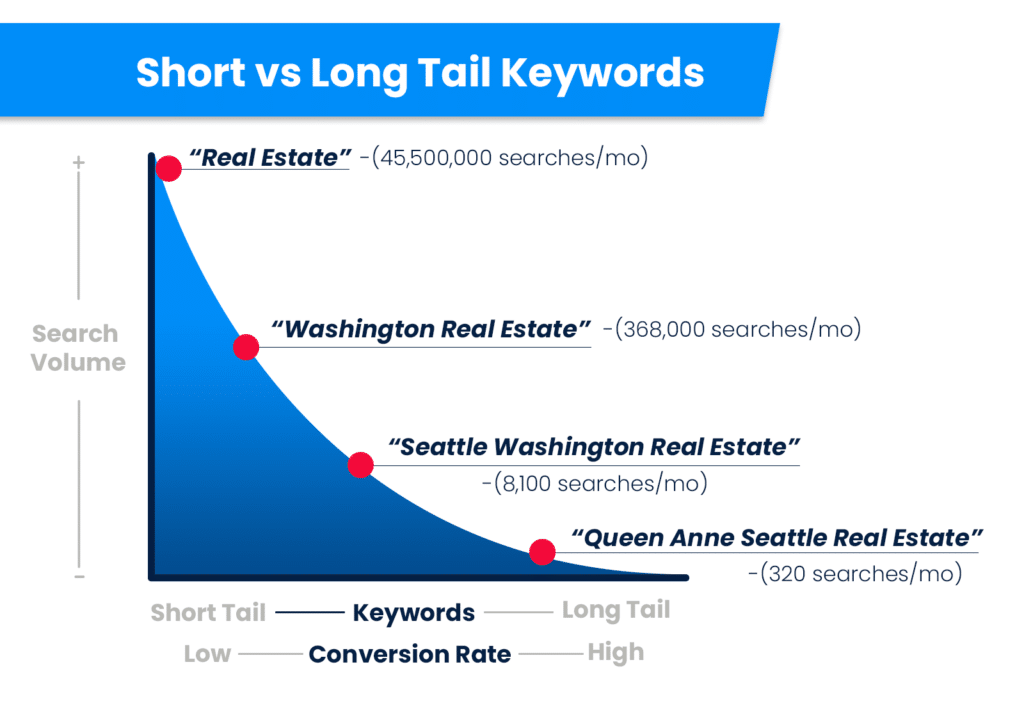
Keywords – What They Are, Why They Matter, and How to Optimize For Them
Keywords are a critical component of your law firm SEO campaign. Why? Because using the right keywords will drive organic traffic to your site. This falls under on-site SEO.
What Are Keywords?
Keywords are the words and phrases that users enter into a search engine like Google. Ideally, you want your website to rank for as many relevant keywords related to your practice areas as possible.
In other words, you want to show up on SERPS when potential clients are entering variations of different keywords related to your legal practice.
There are two main types of keywords you need to consider:
- Short-tail keywords, and
- Long-tail keywords.
These are distinguished by length.
Short-tail keywords, or head keywords, are three words or less. They’re the broadest keywords you’ll find – like “auto insurance.” These are typically the most competitive keywords in the SEO arena. They have an incredibly high search volume but also a low conversion rate.
These are the keywords that people typically use when they’re just starting out their search – and don’t have enough information to tailor their inquiry to their specific needs.
Long-tail keywords are four or more words in length. These tend to be much more specific in nature.
For instance, let’s say someone just discovered that their spouse has been cheating on them. Rather than conducting a broad search for a divorce lawyer, that person might wonder if adultery is grounds for a divorce in their state.
So, they might Google: “is adultery grounds for divorce in California?”

70 percent of Google searches involve a long-tail keyword. It’s much easier to optimize your content to capture these keywords – and rank when a user is on the hunt for this kind of information.

A great course of action involves incorporating head keywords throughout your content while also optimizing your law firm’s website for long-tail keywords.
What is Keyword Research?
Keyword research involves identifying the terms and phrases that potential clients are using in their web searches for legal services and information.
When you conduct keyword research, there’s specific information you should be trying to uncover:

- What are web users searching for?
- What’s the intent behind the searches – what are they trying to accomplish?
- How many people are conducting searches for these keywords?
The more you understand about what people are looking for and why, the more targeted you can be with your content. The more relevant your content, the better the user experience. Both of those things – relevancy and UX – are critically important in Google’s eyes.
An essential puzzle piece of successful online marketing is pursuing the right keywords and phrases for your law firm. If you choose the wrong ones, you could put in a lot of energy and money and never get the desired results.
The Basics of Keyword Research for Attorneys
Investing time and resources into targeted keyword research can pay dividends for years to come.
Here’s a brief overview of the processes, tools, and approaches that can help you devise a winning strategy.
Check Out What Keywords Your Competitors Rank For
One way to identify keywords that can benefit your attorney SEO campaign is to figure out what your competitors are ranking for.
Start with the basics. Through a tool like Google’s Keyword Planner, you can find out how potential clients in your area typically search for your legal niche. Such a tool also offers related keywords, allowing you to get a good idea of just what terms and phrases your audience tends to use.
Within the tool, you’ll find metrics like volume and competitiveness.
- Volume: The average number of times people look for a keyword in a month.
- Competition: How difficult it is to rank for a specific keyword in your area.
A good balance between both is a great start. Don’t shy away from longer phrases, either. Natural language queries tend to make great fodder for blog posts.
Another great tool for this is SEMRush.
SEMRush is a paid service, but it’s quite popular among attorney SEO firms. In fact, when surveyed, 61% of experts indicated that SEMRush was their keyword research tool of choice.
To use SEMRush for keyword research, first, identify your top competitors. You might know this by heart, or you can run a quick Google search to see which firms show up first in the organic results.
Then, simply take the competitor’s URL and run it through SEMRush’s “Organic Research” feature.
Once you run the URL, you’ll have front-row access to all of the keywords it ranks for organically. Click on “view all” to see a complete list.
The results will default to show you which keywords the site ranks highest for – you can change the filter to see which keywords have the highest search volume or traffic.
Complete these steps for all of the top-ranking law firms in your geographic area, and you’ll have a good idea of what keywords you’ll need to target in the content you develop.
Identify Related Keywords and Questions
Let’s say you run a personal injury law firm and really want to draw users who have been injured because of a hernia mesh implant.
It would be wise to include as many keywords as you can that are related to “hernia mesh” and “hernia mesh lawsuit.”
Keyword research tools like SEMRush can help you identify what those related keywords might be.
First, you’d put your short-tail keyword into SEMRush’s “Keyword Magic Tool.”
You’ll get a list of “broad” results. Choose the “related” option to see a list of similar keywords you could incorporate in your content. Filter by “volume” to see the related keywords that generate the most searches.
Another way to find related keywords is to check into the questions that users are asking about your primary keyword.
Choose the “questions” option and filter by volume – you’ll get a list of queries that web users are actively entering into search engines. These questions can (a) offer insight into the intent behind a user’s search and (b) help to expand the scope of your keyword database.
Pro Tip: Use these questions – or some variation thereof – as headers. Google places great emphasis on headers, and users scanning for information will spot what they’re looking for more easily.
Dig Into What People Are Searching For
You don’t have to stick to SEO research tools to find keywords for your campaign. In fact, sometimes it’s a good idea to go straight to the source of people’s questions.
By visiting sites like Avvo, Lawyer.com, and Justia, you can see exactly what kind of legal questions people have.
These questions are great for a multitude of reasons:
- See questions potential clients have for yourself
- Understand the intent behind searches that are being made
- Identify long-tail keywords that can help you rank
- Develop new ideas for content – dedicate entire pages or blog posts to answering popular questions.
Examining the questions on the following sites and others is critical to any attorney SEO strategy.
Avvo
Avvo has a Q&A section that can be a treasure trove of information and offer a lot of up-to-date information about what legal questions people have.
Let’s say you’re a family law attorney and want to rank when someone searches “divorce lawyer near me.”
In addition to targeting head keywords like “divorce lawyer,” it will be important to incorporate keywords and content that speak directly to what people want to know.
Head to Avvo’s Free Q&A and choose “divorce questions.”
You’ll get a list of questions people have for divorce lawyers.
Justia
Justia also has a Q&A section where people can submit questions for attorneys to answer. Again, finding these questions can help add some movement to your SEO campaign.
Justia gives you the option to filter by state, which can be a great benefit when your practice area has very state-specific laws. For instance, if you practice in California, you might want to have some information on equitable distribution on your website, but in-depth discussions might be unwarranted.
Knowing what questions people in your state have can enhance your efforts to rank in your geographic area.
Lawyers.com
Lawyers.com also has a free Q&A section that can be filtered by practice area or a general list of the questions that have been answered most recently.
Unlike Justia and Avvo, questions are more general and not necessarily state-specific. So, you can get a feel for what broad family law issues might be driving people to ask for legal advice.
Keyword Research Tools for Attorney SEO
To do keyword research successfully, you need the right tools – advanced SEO resources that will give you keyword suggestions, tell you how difficult it is to rank for each keyword, and show you potential backlink opportunities. You can also perform an SEO audit on your website to identify current gaps.
Here are some of the ones we recommend:
- SEMRush
- Ahrefs
- Google Trends
- Google Keyword Planner
- Google Search Console
- Keyword Tool.io
- BuzzSumo
- Surfer SEO
- Moz
- KWFinder
- Ubersuggest
- SpyFu
- GrowthBar
Remember, when conducting keyword research, you want to identify keywords that can help you rank and ultimately drive traffic to your site.
The more keywords you target, and the more relevant those keywords are to your practice area, the better your chances of achieving these goals. If you have more questions, give us a call or check out our attorney SEO FAQ section.
Up Next: Content Optimization for Attorneys
